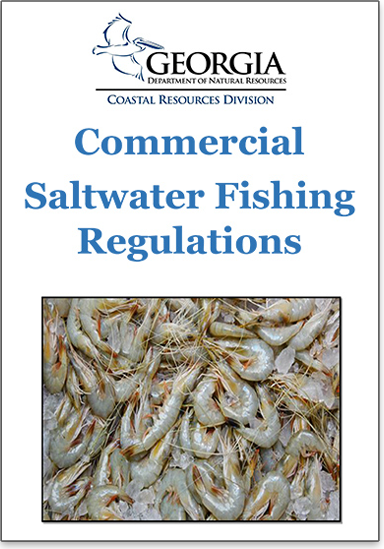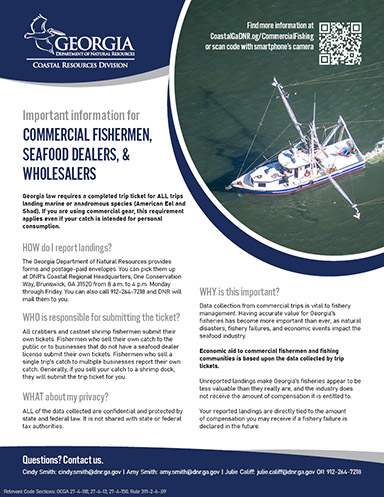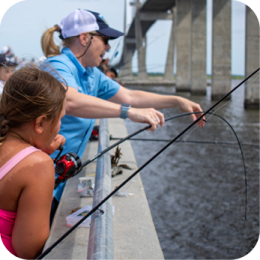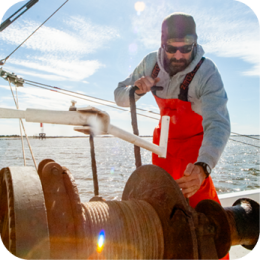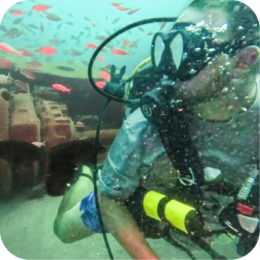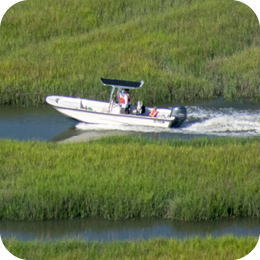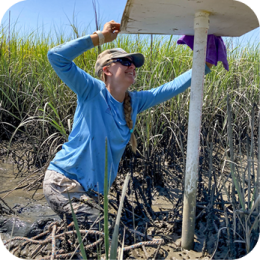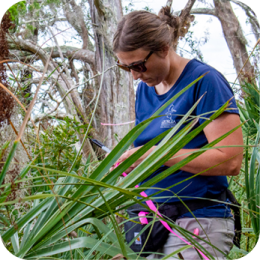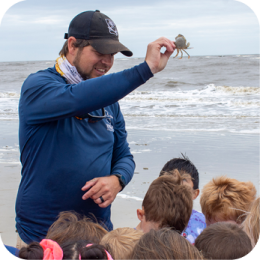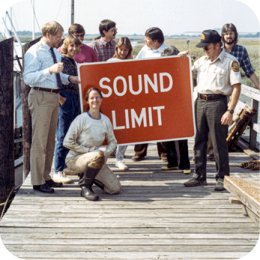
DNR photo.
Georgia's saltwater bounty isn't just a delicious treat; it's a vital industry. Commercial fishing for shrimp, blue crab, shellfish, and other marine species weaves itself into the fabric of the coastal economy, supporting communities and livelihoods. These fisheries generate millions annually, providing jobs for harvesters, processors, distributors, and restaurant workers. Beyond economics, these fishermen serve as stewards of the sea, adhering to strict regulations and contributing to sustainable practices. Their catches grace plates across the region, fueling tourism and showcasing the unique flavors of Georgia's waters. From plump shrimp to succulent blue crab, these fisheries offer a taste of the coast, connecting consumers to the ocean's bounty. While challenges like fluctuating seasons and environmental concerns exist, responsible commercial fishing ensures a vibrant seafood industry, nourishing both the economy and the coastal soul.
Commercial Fishing Regulations
Fishermen who take finfish or other seafood for commercial sale must possess a valid commercial fishing license and if a boat is used, a commercial boat license. The license must be on your person while fishing (O.C.G.A. 27-4-110). Commercial fishermen must abide by season, creel and size limits when harvesting any of the finfish for which the Georgia General Assembly or the Board of Natural Resources (Board) has created regulations. However, individuals fishing with a valid federal commercial fishing permit in federal waters may exceed the creel limits provided those waters are open for commercial fishing with specified gear, minimum size limits are observed, the quota has not been met, and the Board has not prohibited sale of the species. Finfish for which there are minimum sizes and/or creel and possession limits must be landed head and fins intact. Transfer at sea is prohibited. (O.C.G.A. 127-4-130.1)
![]() Download the Georgia Commercial Saltwater Fishing Regulations guide
Download the Georgia Commercial Saltwater Fishing Regulations guide
![]() Visit the South Atlantic Fishery Management Council for federal regulations
Visit the South Atlantic Fishery Management Council for federal regulations
![]() Visit NOAA for Highly Migratory Species (billfish, sharks, tuna, swordfish)
Visit NOAA for Highly Migratory Species (billfish, sharks, tuna, swordfish)
Important Information for Commercial Fishermen, Seafood Dealers, & Wholesalers
Georgia law requires a completed trip ticket for ALL trips landing marine or anadromous species (American Eel, American Shad, and Hickory Shad). If you are using commercial gear, this requirement applies even if your catch is intended for personal consumption. This flyer provides information about how to report landings and who is responsible, how it could impact your future, and who you can contact with questions.
Why is this important? Data collection from commercial trips is vital to fishery management. Having accurate value for Georgia’s fisheries has become more important than ever, as natural disasters, fishery failures, and economic events impact the seafood industry.
Economic aid to commercial fishermen and fishing communities is based upon the data collected by trip tickets. Unreported landings make Georgia’s fisheries appear to be less valuable than they really are, and the industry does not receive the amount of compensation it is entitled to.
![]() Download the Important Information flyer
Download the Important Information flyer
Commercial Fishing Licenses
Commercial fishing licenses may be purchased in person at:
![]() Coastal Regional Headquarters
Coastal Regional Headquarters
One Conservation Way
Brunswick, GA 31520
(912) 264-7237
When applying for a commercial license, you must include:
- Completed commercial license application
- Application for public benefit
- Copy of a valid government-issued photo ID
- Check or money order payable to Georgia Department of Natural Resources (find correct fee)
- OR the completed and signed credit or debit card form (included in application packet download)
- If purchasing a vessel, include a copy of your state registration or U.S. Coast Guard documentation
- If your vessel is used for trawling, include the original bond or affidavit (no copies)
Download the Commercial Fishing License Application Packet:
![]() Contact NOAA Fisheries for federal commercial fishing permits.
Contact NOAA Fisheries for federal commercial fishing permits.
Saltwater Charter/Guide Licenses
Saltwater Charter/Guide licenses may be purchased three ways:
![]() In person at Coastal Regional Headquarters, One Conservation Way, Brunswick, GA 31520
In person at Coastal Regional Headquarters, One Conservation Way, Brunswick, GA 31520
When purchasing in person, remember to bring:
- Your driver's license or government-issued photo ID
- State registration number or U.S. Coast Guard documentation number
- If purchasing the optional customer license, proof of U.S. Coast Guard license is required
- The license office is open from 8 a.m. to 4 p.m. Monday through Friday, excluding state holidays
![]() Mail your application to DNR Law Enforcement, One Conservation Way, Brunswick, GA 31520
Mail your application to DNR Law Enforcement, One Conservation Way, Brunswick, GA 31520
When purchasing by mail, be sure to include:
- Fully completed and signed license application. Include state boat registration number or U.S. Coast Guard documentation number on the application.
- A photocopy of your driver's license or government-issued photo ID
- If purchasing the optional customer license, proof of U.S. Coast Guard license is required
- A check or money order made payable to the Georgia Department of Natural Resources. Remember to add $5 transaction to the base fee per license. If paying by credit or debit card, provide all the information required in the Saltwater Guide Application packet.
- Your license will be mailed to the address you provide on your application
![]() Email your application to le.brunswick@dnr.ga.gov
Email your application to le.brunswick@dnr.ga.gov
When purchasing a license by email, be sure to follow the same steps as required for mailing your application via U.S. Postal Service. A PDF scan is the preferred method of receiving emailed applications. Remember to fill out the debit/credit card authorization and add $5 to the base fee for each license.
Commercial License Types and Fees
Seafood Dealer’s License:
This license is required by any person or entity, other than the end-consumer, who purchases seafood products from a harvester unless the harvester is a licensed seafood dealer. Reporting requirements apply: This license and distinct and separate from seafood dealer’s licenses issued by other agencies.
Trawler Crew License:
An optional license covering all crew members aboard a food shrimp trawler while fishing. Crew members are exempt from the personal commercial fishing license and endorsements only while aboard a vessel operating with a valid crew license. This license is only valid for the vessel for which it is purchased and is not transferable.
Species Endorsements:
Endorsements are required of licensed commercial fishermen harvesting or landing any of the species listed below. If the vessel has a valid trawler crew license no license or endorsement is required for the crew while landing and harvesting those species with a “yes” in the “Covered by Trawler Crew License” column.
Do you need a species endorsement?
| Species | Endorsement Requirements | Covered by Trawler Crew License? |
| Bait Minnows | Required for harvesters. Cashiers not actively harvesting are exempt | NO |
| Bait Shrimp | Required for harvesters. Cashiers not actively harvesting are exempt | NO |
| Cannonball Jellyfish | Required to harvest or land. The vessel captain or owner must have a purchasing agreement with an approved buyer on file with the Coastal Resources Division | YES |
| Catfish in Saltwater | Required for harvest or landing in saltwater. Not required for freshwater harvest | N/A |
| Crab | Required for employees of licensed commercial crabbers, soft shell dealers, and trawler crew | YES |
| Eel | Required to harvest eels | N/A |
| Finfish | Required to harvest finfish, including trawl-caught fish, OTHER than shad, catfish in saltwater, and bait minnows. | YES |
| Food Shrimp | Required for employees of licensed commercial shrimp cast net harvesters and trawler crew | YES |
| Horseshoe Crab | Required to harvest or land, including trawler crew | YES |
| Shad | Required to harvest or land American and Hickory shad. | N/A |
| Shellfish | Required for master collection permittees and employees actively involved in harvest or landings of shellfish | N/A |
| Whelk | Required to harvest or land whelk, including trawler crew | YES |
License Fees
Licenses are valid from April 1 to March 31 of the following year. There is an additional $5 transaction fee per license.
| License Type | Resident | Non-Resident |
|---|---|---|
| Commercial Fishing License | $20 | $200 |
| Crabbing | $20 | $200 |
| Crab Pots (per pot) | $2.50 | $2.50 |
| Cast Net Shrimp | $250 | $2500 |
| Trawl Vessel Crew | $200 | $600 |
| Species Endorsements | $5 | $10 |
| Bait Dealer | $40 | $250 |
| Soft-Shell Crab Dealer | $40 | n/a |
| Seafood Dealer | $40 | n/a |
| Trawl Vessel | $85 + $3/ft over 18ft | +$150 |
| Non-Trawl Vessel | $5 | + $50 |
| Pier License | $400 | n/a |
| Saltwater Fishing Guide | $25 | $50 |
| Customer License up to 6 | $150 | $400 |
| Customer License 7+ | $400 | $400 |
Landings Data
Commercial Seafood Landings data are collected via trip tickets completed by seafood harvesters and dealers. Requests for data should be directed to landings@dnr.ga.gov or by calling 912-264-7218. Georgia and coastwide landings data are also available from the Atlantic Coastal Cooperative Statistics Program (ACCSP) and the National Marine Fisheries Service (NMFS). however, those data may be incomplete or out of date.
Data Collection and Surveys
Division staff conducts a variety of regularly scheduled surveys to gather biological, distribution, habitat, catch and effort data on a number of recreationally important species. Examples include the carcass recovery project, the cooperative angler tagging project, recreational angler surveys, red drum and shark longline fishing, seafood harvest reporting, and trawl surveys. This information is used by the Department and interstate organizations to make resource management decisions at both the state and regional levels. Click this link to learn more about Data Collection and Surveys.
Shellfish Harvest
The expansive marshes and nutrient-rich waters of coastal Georgia offer the entrepreneur a lucrative career in the commercial cultivation and harvest of shellfish. Currently, hard clams (Mercenaria mercenaria) and the Eastern oyster (Crassostrea virginica) are the only species cultivated and harvested in commercial harvest areas.
Click here for information on Commercial Shellfish Harvesting
